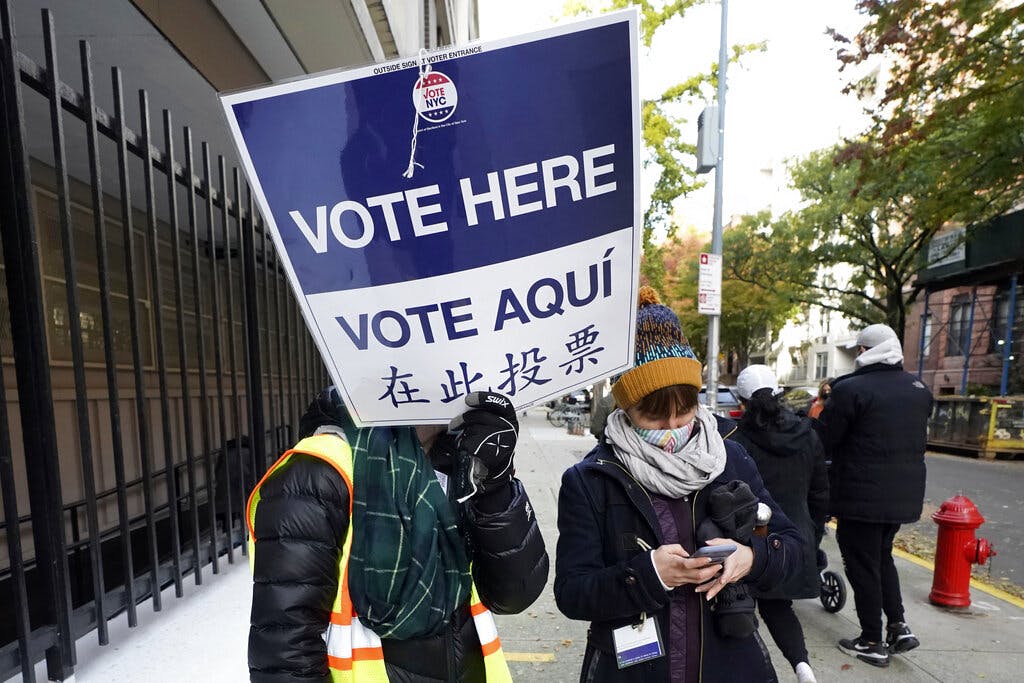New York’s Highest Court Upholds Absentee Ballot Law That Could Impact Outcome of Key House Races
The judges say the law does not ‘violate the constitutional principles of separation of powers or of judicial review.’

The New York Court of Appeals, the state’s highest court, is upholding a law that Republicans say could open the door for fraudulent votes to be cast in upcoming elections. The high court’s ruling will likely be the last word on the matter, as Republicans are not expected to appeal it to the Supreme Court at Washington.
The court released its unanimous decision in the case Amedure v. New York, which challenged a 2021 law that relaxed the procedures for handling a mail-in ballot when its validity is in question.
Republicans raised concerns that the law was unconstitutional in the changes made to the process for deciding whether a ballot is valid. However, the judges found the plaintiffs “failed to meet their ‘heavy burden’” to prove the law ran afoul of the state’s constitution.
Previously, a board of commissioners, equally divided between members of the two major parties, would have to agree that a ballot was valid to be counted.
Under the 2021 law, if the commissioners are deadlocked on whether a ballot is valid due to questions about an issue with the signature on it, the ballot is required to be processed and counted. Once it is counted, it cannot be challenged.
Republicans argued the updated language violates a portion of the New York State constitution that requires “equal representation of the two political parties,” which they also interpreted to mean there must be bipartisan agreement on whether a ballot is valid.
However, the judges wrote, “We disagree.” They said the mere requirement that the board of commissioners is equally divided between members of the two parties “secures that equal representation” and that the constitution does not require commissioners to agree.
The judges also noted the election law lets commissioners of both parties decide if a ballot is valid, “Thus, no single Board member has any more authority than any other member over the canvassing process, and neither party carries more sway over the process than the other.”
The court also dismissed concerns that requiring a ballot to be counted in the case of a deadlock opens the door for fraudulent votes to be cast. The judges shared the opinion of an appeals court that there are “numerous safeguards through which the courts can address and prevent electoral fraud as necessary.” They said in the “rare instance” where fraud occurs, third-party observers can seek a court order to stop the ballot canvassing process.
“We hold that the statute does not violate the constitutional principles of separation of powers or of judicial review,” the court said.
New York Democrats celebrated the decision, with the state Senate deputy majority leader, Michael Gianaris, telling the Sun, “Today’s Court of Appeals decision marks another decisive win for New York voters.”
“I remain committed to ensuring all eligible voters can be confident their vote will be counted. As Election Day approaches, we can now put behind us the latest Republican attempt to infringe on these inalienable rights and focus on helping New Yorkers,” he added.
A spokesman for the New York Republican State Committee, David Laska, has called the law an “insult to fair elections.”
A Congressman from New York, John Faso, also told the Sun he is “very disappointed” in the decision because it removes the “bipartisan nature” of reviewing ballots. However, he does not expect state Republicans to try to take the case to the Supreme Court.
During arguments before the Court of Appeals, lawyers for Republicans argued the process could lead to a commissioner disagreeing over whether a ballot was cast by someone who is registered to vote in another state or who is dead, and the ballot being counted anyway.
However, lawyers for the state argued that while ballots that are cast cannot be challenged or reversed, observers of the process could go to court to halt the canvassing process if they witness “systemic corruption.”
While studies have found that the chance of fraud associated with mail-in ballots is very low, the relaxed procedures for dealing with questions about a ballot’s validity could lead to questions about which ballots were counted in crucial elections.
Indeed, two judges who dissented from a previous decision to uphold the law said it “has the potential to inhibit the rights of New Yorkers to cast their ballot by preventing objections to a ballot cast by someone else in their name.”
In a trio of Republican-held House seats that Democrats are seeking to win back this year, which could determine which party controls the lower chamber, questions about whether invalid ballots were counted could threaten to overshadow the election and lead to prolonged fights over the outcome.

